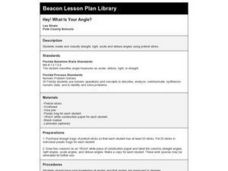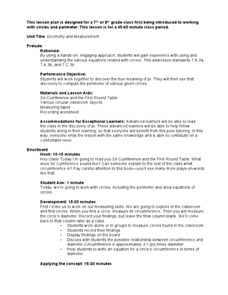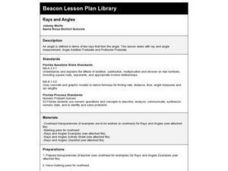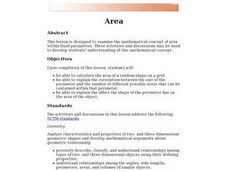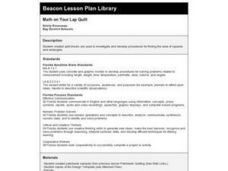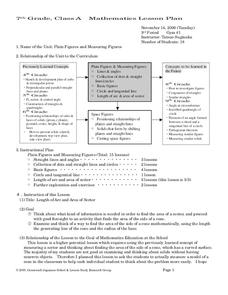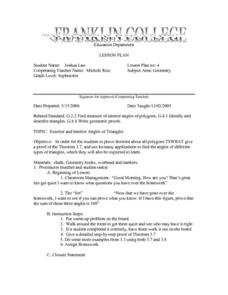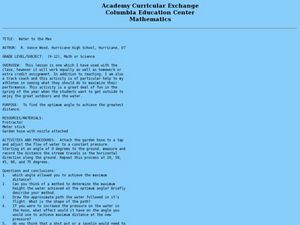Curated OER
Hey! What Is Your Angle?
Fifth graders create and classify straight, right, acute and obtuse angles. In this clever lesson, 5th graders utilize pretzel sticks to form different types of angles. Best of all, they get to eat them at the end!
Curated OER
Geometry and Measurement
Learners view a right triangle displayed by the teacher. Students measure legs and the interior angles of the triangle. They look for a pattern or relationship between the legs and angles. Learners use pegboards and string to create more...
Curated OER
The Sum of All Angles
Young scholars add up the different angles using the angle addition postulate. In this geometry instructional activity, students differentiate between interior and exterior angles. They calculate the different angles for triangles and...
Curated OER
Rays and Angles
Students view examples of a ray, opposite rays, collinear rays, angles, and straight angles. They discuss and demonstrate how to use a protractor and complete worksheet problems on rays and angles.
Curated OER
Study Buddies: Classifying Triangles
In this math worksheet, students analyze an informative chart about the measurement and angles of equilateral, isosceles and scalene triangles. Students then answer 5 questions about classifying triangles.
Curated OER
Digger and the Gang
Help online friends Digger and Sprat from the BBC series to solve math problems! In a series of activities, your class will use data sets to calculate measurements, averages, means, and probabilities. The class completes worksheets and...
Curated OER
A Special Relationship
Young scholars discover the relationships of the lengths of the sides of right triangles and right triangles using a series of drawings on dot paper. They investigate and solve problems of standard (customary and metric units) and...
Curated OER
Area Applet
Elementary math classes calculate the area of a shape and explain the correlation between the size of the perimeter and the areas that can be contained within that perimeter. They also explain the effect the shape of the perimeter has on...
Curated OER
Length, Perimeter, and Area
Students explore the concepts of length, perimeter, and area. In this math lesson, students use Shape Explorer to practice finding length, perimeter, and area.
EngageNY
The Angle-Angle (AA) Criterion for Two Triangles to Be Similar
What do you need to prove triangles are similar? Learners answer this question through a construction exploration. Once they establish the criteria, they use the congruence and proportionality properties of similar objects to find...
EngageNY
Using Trigonometry to Find Side Lengths of an Acute Triangle
Not all triangles are right! Pupils learn to tackle non-right triangles using the Law of Sines and Law of Cosines. After using the two laws, they then apply them to word problems.
EngageNY
The Side-Angle-Side (SAS) and Side-Side-Side (SSS) Criteria for Two Triangles to Be Similar
Playing with mathematics can invoke curiosity and excitement. As pupils construct triangles with given criteria, they determine the necessary requirements to support similarity. After determining the criteria, they practice verifying...
Curated OER
Math On Your Lap Quilt
Get creative juices flowing when you allow groups to figure out a procedure for how to find the area of squares and rectangles. They may use the individual patchwork blocks, or they may design one using the Design Template.
Curated OER
Angles in Art Lesson
Students examine the correlation between art and math. Using their computers, students construct and measure angles. Students identify the properties of angles and polygons. They engage in the Angles program on their Palm and use the...
Curated OER
Patterns in the Sums of Polygon Angles
Sixth graders are introduced to how to calculate the interior angles of polygons. Using a worksheet from a previous lesson, they use those answers to determine the sum of the angles of the pattern blocks. To end the lesson, they tear...
Curated OER
Plain Figures and Measuring Figures
Students investigate basic geometric concepts. In this geometry lesson plan, students explore solids through measuring and modeling. This assignment models the importance of understanding concrete objects in geometry.
Curated OER
Introducing Angles
Sixth graders identify, compare and interpret the characteristics of polygons and angles in order to meet spatial sense, geometry and measurement standards. They also sort shapes into three categories, polygons (regular and irregular)...
Curated OER
Inching Our Way through Measurement
Students review how to use an inch ruler and listen to the story, Inch by Inch by Leo Lionni. In this measuring lesson, students work in small groups to create an Inch Poster. Students then use an inch ruler to measure different objects...
Curated OER
Exterior and Interior Angles of Triangles
Tenth graders explore the exterior and interior angles of triangles. They use a theorem in order to prove a theorem about all polygons. Students use the theorem and its applications to find the angles of different types of triangles.
Curated OER
Water to the Max
Students experiment with the angle that yields the greatest distance of water at constant pressure. In this experiment with the angle that yields the greatest distance of water at constant pressure lesson, students shoot water out of a...
Curated OER
Perimeter
Students study about perimeter and the units used to measure perimeter using a variety of materials including their hands, feet, rulers, and computer applets. They understand such attributes as length, area, weight, volume, and size of...
Curated OER
Shaking Up Ice Cream
Upper graders use a variety of tools to measure liquid and solid ingredients in an ice cream making recipe. Following written and oral directions and accurately timing themselves forms the basis of this lesson.
Curated OER
Geometry: Lesson 8
Eighth graders engage in a lesson that is concerned with the finding of angles that are found in different two dimensional figures. They compare and contrast exterior and interior angles while also determining the unknown measures of...
Curated OER
You Can't Go Wrong with a Right Triangle 2
Upper graders use the properties of right angle trignonmetry to measure objects such as the school flagpole. They solve real world problems using these properties.


